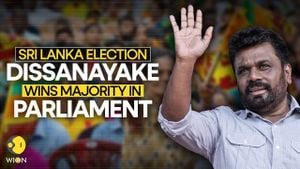Across the vast expanse of China, where rapid technological advances are celebrated, there lies a troubling undercurrent: the suppression of scientific voices. This phenomenon has been alarmingly highlighted by public attacks on renowned scientists like physicist He Zuoxiu and esteemed Fields Medal winner Yau Shing-Tung. Recently, these scientists have found themselves at the center of online hostility directed by nationalistic bloggers, raising serious questions about scientific discourse within the country.
He Zuoxiu, at 97 years old, is not just any scientist; he's one of China’s most respected physicists, affiliated with the Chinese Academy of Sciences (CAS). Alongside him is his wife, Qing Chengrui, who also works at CAS. A few circulating video clips featuring the couple candidly discussing the disparities between China’s scientific capabilities and those of the United States and Europe have ignited fiercer nationalistic sentiment online. Both scientists pointed out, with disheartening clarity, how dependent China remains on imported medical technologies and advanced research.
For their honest assessments, both He and Yau have faced intense backlash. Labels such as "pro-American" have been flung at them merely for stating their observations about gaps in China’s basic research. This labeling doesn't stand alone; it reflects broader internet trends wherein online influencers capitalize on incendiary nationalistic rhetoric to drive engagement and traffic. But the consequences of silencing dissenting voices are far-reaching.
A recent editorial from The Paper, which is associated with the state-owned Shanghai United Media Group, shed light on this issue, sounding alarms about the state of scientific discussions online. The article suggested, “While China has made remarkable achievements in science and technology...it would only impede its advancement by being overconfident and turning a blind eye to the problems.” Such reflections serve as cautionary reminders of how patriotism can sometimes morph dangerously, undermining rather than promoting the country’s scientific integrity.
The editorial went on to universally condemn the encroachment of what it termed “fandom culture” — the phenomenon where enthusiasts passionately rally behind their interpretations, often overlooking evidence or rational discourse. The article warned this could tarnish scientists’ reputations and hinder the future of China’s technology sector.
Such issues are not new. Over the years, scientists expressing critiques or realistic assessments of China’s scientific arena often find themselves marginalized or vilified. Elimination of alternative viewpoints may put the nation’s scientific progress at risk. Critics argue the relentless pursuit of national pride may lead to stagnation, where questioning established norms becomes taboo, stifling creativity and progress.
This trend raises the stakes for scientific communication within China. Many experts argue for the need to strike a balance between promoting national achievements and engaging with constructive criticism. Without the latter, the nation risks becoming too insular, unable to address its vulnerabilities effectively.
He Zuoxiu’s candid remarks about the quality of China’s medical equipment being largely imported underscored the importance of international collaboration and investment. Experts contend countries must leverage knowledge from diverse global perspectives to fuel progress rather than shun them due to rising nationalism.
Meanwhile, Yau Shing-Tung, another eminent figure, who has faced his share of backlash, continues to advocate for higher scientific standards and education. His commitment serves as a reminder of the importance of educators and researchers speaking truth to power, regardless of the potential fallout.
Worryingly, social media dynamics can amplify voices stifling scientific inquiry. Online platforms have become battlegrounds for ideologies, spreading misinformation and hostility rather than fostering healthy debate. Nationalistic outbursts against scientists could lead to widespread disillusionment among younger researchers, who might feel compelled to either self-censor or conform to the prevailing narrative to avoid backlash.
Voices of dissent, like those of He and Yau, serve as beacons for truth. They highlight the dire need for open dialogue within academic circles. Scholars argue academic freedom, particularly within rapidly developing countries, is not merely advantageous but imperative for genuine success on the global stage.
While China has made historic strides, constant vigilance is necessary to prevent stagnation through overconfidence. The calls to respect scientific integrity extend beyond individual scientists; they reflect the necessity for institutional support promoting openness, diversity, and collaboration across the board.
China’s leaders must recognize the value of its scientists, regardless of their critiques, asserting the importance of diverse opinions to push the frontiers of knowledge. Failing to listen or engage with these voices could undermine China’s future, as it risks alienation from the global scientific community.
Steps to mitigate this situation will require concerted efforts: educational reforms promoting inclusivity, platforms encouraging dialogue without fear of retribution, and policies safeguarding academic freedom. Only by fostering environments where differing viewpoints can coexist can China cultivate innovative thought leadership.
It remains to be seen whether the voices of He Zuoxiu, Yau Shing-Tung, and others will inspire enough momentum to drive change. For now, their experiences highlight the delicate balance between nationalism and scientific integrity, one the nation must navigate thoughtfully.



